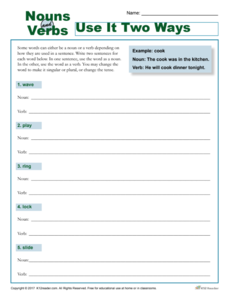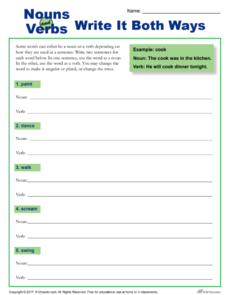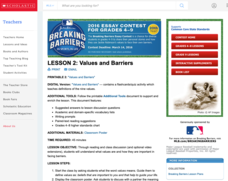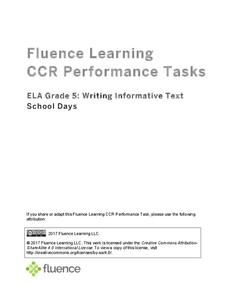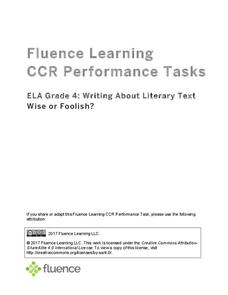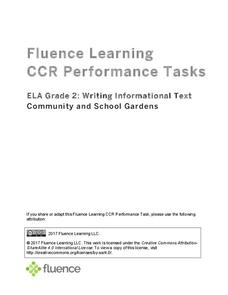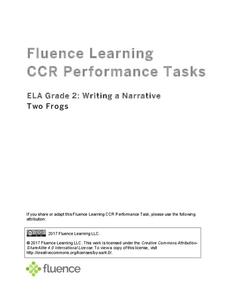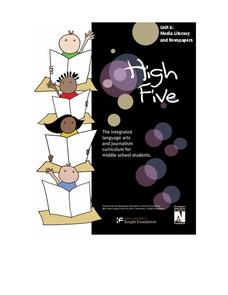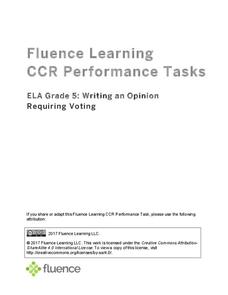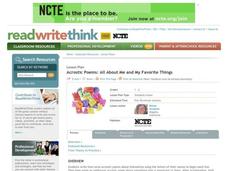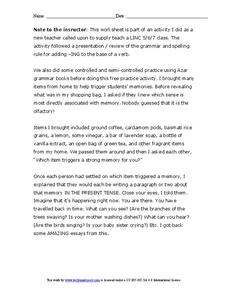K12 Reader
Nouns Verbs: Use It Two Ways
Scholars show what they know about nouns and verbs in a learning exercise that requires them to read five words then use them in two sentences—as a noun and a verb.
Education.com
St. Patrick's Day Writing: If I Found a Pot of Gold...
This St. Patrick's Day, young writers imagine they found a pot of gold at the end of a rainbow. After a class discussion and brainstorming, scholars compose a narrative essay making sure they incorporate transitions and at least three...
K12 Reader
Nouns Verbs: Write it Both Ways
A five-item worksheet challenges scholars to write two sentences using the same verb in two different ways—as a noun and a verb.
Scholastic
Lesson 3: Essay Organizer
A three-minute exercise warms-up scholars' writing abilities in order to follow a writing process that ends in an essay. The essay's topic is a barrier and the values used to break it. Four steps include choosing a topic, jotting-down a...
Scholastic
Lesson 2: Values and Barriers
Scholars investigate and discuss the importance of values and how they can be used to break barriers. Small groups work collaboratively to examine the text and draw inferences to answer questions. A writing assignment challenges pupils...
Teach It Primary
The Pied Piper of Hamelin
Six tasks make up a lesson plan designed to reinforce comprehension and language skills using the poem "The Pied Piper" by Robert Browing. Scholars discuss and define unknown words, identify adjectives and onomatopoeia, review complex...
Teach It Primary
What Letter Will You Write?
After reading "The Pied Piper of Hamelin," scholars discuss the emotions the events provoked in its characters. In pairs, writers compose a letter depending on the topic and style of their choice then reply to their own or a peer's...
ETFO
Free Verse Poetry Rubric
Follow poetry instruction with a four-category rubric designed to guide budding poets' writing of free verse poetry.
Birmingham City Schools
Stick to the Point: Getting It Right with Constructed Responses
Practice writing constructed responses with a 26-slide presentation. Developed to guide scholars through the appropriate steps, the resource assists them in providing a well-considered answer.
Fluence Learning
Writing Informative Text: School Days
A three-part writing assessment challenges scholars to think critically about schools of the past and present. Learners read informative texts, answer questions to prepare for a discussion, research in small groups, complete a Venn...
Fluence Learning
Writing About Literature: Comparing and Contrasting Characters in Heidi
Scholars read excerpts from the story, Heidi, in a three-part assessment that focuses on comparing and contrasting characters. Each part contains three tasks that challenge learners to discuss, answer comprehension questions,...
Fluence Learning
Writing an Opinion: Student Council
A three-part assessment challenges scholars to write opinion essays covering the topic of the student council. After reading three passages, writers complete a chart, work with peers to complete a mini-research project, answer...
Fluence Learning
Writing About Literary Text: Wise or Foolish?
A three-part assessment promotes reading comprehension skills. Class members read literary texts and take notes to discuss their findings, answer comprehension questions, write summaries, and complete charts.
Fluence Learning
Writing About Informational Text: Everybody Can Bike
A three-part assessment challenges scholars to read informational texts in order to complete three tasks. Following a brief reading, class members take part in grand conversations, complete charts, and work in small groups to research...
Fluence Learning
Writing Informational Text: Community and School Gardens
Two informational texts feature community gardens of the past and present and how seeds grow. Scholars read, discuss what they have read, complete a timeline, define words, and compose a brief essay about the texts' main idea.
Fluence Learning
Writing a Narrative: Two Frogs
Three options offer young writers the opportunity to read a short story, answer questions, and write a response. A handy language arts resource focuses on reading comprehension and analyziing the story's lesson: look before you leap.
American Press Institute
High Five: Media Literacy and Newspapers
Teach the five different types of media with the first of three in a media literacy unit. Learners create and propose a final newspaper project, which must address information covered throughout the unit.
American Press Institute
High Five: Go to Press
High school scholars learn valuable information about how to run a newspaper in the third and final installment of a media literacy series. The unit scaffolds learners to success with background information before they plan for...
Curriculum Corner
Wonderful Words for Writing!
Twenty slides make up a set of festive, May-themed writing prompts designed to grab scholars' attention and warm-up their writing skills. Prompts include story starters, holidays, research questions, the five senses, and more!
The New York Times
I Don’t Think So: Writing Effective Counterarguments
When it comes to writing effective arguments, writers must do more than simply make a claim, counterarguments must be considered. Aspiring writers analyze counterarguments in editorials, and then learn how to write counterarguments in...
ReadWriteThink
Scaffolding Methods for Research Paper Writing
Rome wasn't built in a day, but researchers can be with proper scaffolding. This writing unit has scholars write a research paper through scaffolding of various parts of the process. Learners begin with identifying a topic and crafting a...
Fluence Learning
Writing an Opinion Requiring Voting
Challenge writers to compose an essay detailing their stance on, and the history of, voting. Three assignments, each broken down into three parts, requires fifth graders to take notes, read and complete charts, write paragraphs, compare...
National Council of Teachers of English
Acrostic Poems: All About Me and My Favorite Things
Budding poets create two acrostic poems, one for their name and another using a word of their choice. Over the course of five days, scholars compose, revise, publish, and share their work with their peers.
Curated OER
Scent-Inspired Composition
Our sense of smell has a wonderful way of bringing back memories. Unlock those memories with an olfactory-inspired writing prompt that challenges writers to tell a story about a specific smell and the memories it conjures.


